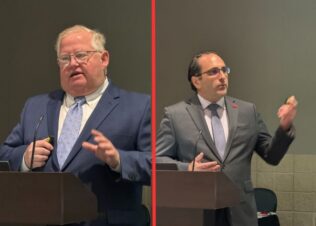As the Covid-19 pandemic has begun to spread across countries and industries, the commercial construction industry has found varied methods to adapt to changes in workforce, funding and supply chains. Yet those facing changes to their budgets and schedules still bear responsibility in ensuring possible recovery during what may be considered a force majeure event, typically acts of God, fires, floods and other natural disasters that are not within the control of the contractor. Project and Construction Managers will need to not only adapt to the impacts of the current climate, but reconsider plans in order to help mitigate ongoing damages and delays.

Construction management thought leader Jim Gallagher, Principal of Resolution Management Consultants, explains, “during this kind of emergency, each project team will need to make decisions about how to proceed based on whether they’re able to adhere to social distancing recommendations, to get the equipment and supplies they need as scheduled, even to maintain the funding they expected to receive to move forward. But it is incumbent on the contractor to properly document and capture these costs and time impacts to allow for recovery, should contracts permit.”
Gallagher offers 4 suggestions to contractors and other construction participants to better put themselves in position to weather the changing parameters of the COVID-19 landscape:
- Capture and Record. Making a detailed record of a construction project’s progress when certain restrictions and quarantines were announced is essential in documenting the impact of the virus on coming change orders and potential disputes over damages down the line. It should also be noted that not all claims can be attributable to this particular event if they were underway or inevitable prior to the force majeure.
- Plans in Place to Mitigate. Each project leadership team will make its own determination about continuing or halting work during this time, but all will face decisions about the impacts of COVID-19 on their existing plans and workers. This could mean staggering work schedules to reduce overlap of crews working together through developing back up preparations in case people, equipment or supplies don’t arrive on site. While we can’t prepare for everything, we have to do our best to reduce the impact of the event.
- Communicate with Construction Participants. This particular force majeure event is occurring over a long period and evolving on a daily basis. That means as prepared as your team may be, various factors can continue to alter costs and schedules. Keeping owners, designers, representatives, trades, suppliers, local governments and others on the same page can help to further stem the effects of the developing impacts of COVID-19.
- Evaluate a Return to Normalcy. When work does eventually return to normal, we can’t presume that will mean going back to where we were when the virus began. With the potential for people, equipment, and supplies to still be unavailable, construction partners need to be flexible and stagger plans to best accommodate others’ return to normalcy as well.
“Being prepared and being flexible are two of the best ways to navigate an ongoing force majeure event such as this one,” notes Gallagher. “Communication among construction partners is key to mitigating the impacts on costs and schedules, and putting the project in the best position to allow for recovery down the line.”
In addition to these tips, Resolution Management Consultants, Inc. has developed the following guidance for Contractors to monitor and update the project schedule. The intention of these guidelines is to memorialize, to the extent possible, the schedule impacts and delay that may be attributed to the COVID-19 crisis and place the Contractor in a position to present a cause-effect analysis in its recovery efforts for time-related cost overruns.
Click on link to access article: Construction Schedule Controls to Document COVID-19 Impacts.
About Resolution Management Consultants
Resolution Management Consultants, Inc. (RMC) is a nationally recognized consulting firm headquartered in Marlton, NJ. There are two sides to the business: the construction planning and management aspect − helping clients build more successful projects − and the litigation aspect − should matters go to court, providing analysis and testimony as expert witnesses. Founded in 1993 by veterans in the construction, contracting and engineering professions, RMC has assisted numerous private owners, public agencies and contractors in either achieving project goals or resolving cost and time disputes between the contracting parties.




Join the conversation: